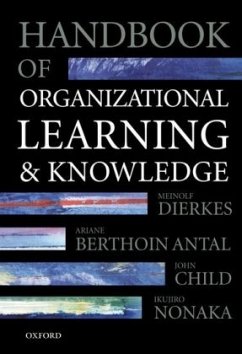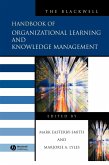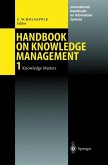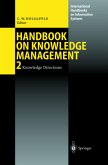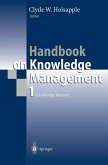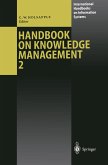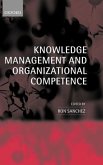Handbook of Organizational Learning and Knowledge
Herausgegeben:Dierkes, Meinolf; Berthoin Antal, Ariane; Child, John
Handbook of Organizational Learning and Knowledge
Herausgegeben:Dierkes, Meinolf; Berthoin Antal, Ariane; Child, John
- Broschiertes Buch
- Merkliste
- Auf die Merkliste
- Bewerten Bewerten
- Teilen
- Produkt teilen
- Produkterinnerung
- Produkterinnerung
In an era of far-reaching changes, organizational learning and knowledge creation are high on the agenda of social scientists, managers, and consultants worldwide as they seek to adapt to new environments.
This work provides a comprehensive overview of how the concept of organizational learning emerged, how it has been used and debated, and where it may be going. It summarizes the state of the art and provides a full account of the diverse approaches, themes, issues, and debates of the field. The handbook unites a team of international authors, who examine both the central themes and key…mehr
Andere Kunden interessierten sich auch für
![The Blackwell Handbook of Organizational Learning and Knowledge Management The Blackwell Handbook of Organizational Learning and Knowledge Management]() Mark Easterby-Smith / Marjorie LylesThe Blackwell Handbook of Organizational Learning and Knowledge Management184,99 €
Mark Easterby-Smith / Marjorie LylesThe Blackwell Handbook of Organizational Learning and Knowledge Management184,99 €![Handbook on Knowledge Management 1 Handbook on Knowledge Management 1]() Clyde W. Holsapple (ed.)Handbook on Knowledge Management 1121,99 €
Clyde W. Holsapple (ed.)Handbook on Knowledge Management 1121,99 €![Handbook on Knowledge Management 2 Handbook on Knowledge Management 2]() Clyde W. Holsapple (ed.)Handbook on Knowledge Management 2161,99 €
Clyde W. Holsapple (ed.)Handbook on Knowledge Management 2161,99 €![Handbook on Knowledge Management 1 Handbook on Knowledge Management 1]() Clyde W. Holsapple (ed.)Handbook on Knowledge Management 1130,99 €
Clyde W. Holsapple (ed.)Handbook on Knowledge Management 1130,99 €![Handbook on Knowledge Management 2 Handbook on Knowledge Management 2]() Clyde W. Holsapple (ed.)Handbook on Knowledge Management 2161,99 €
Clyde W. Holsapple (ed.)Handbook on Knowledge Management 2161,99 €![Knowledge Management and Organizational Competence Knowledge Management and Organizational Competence]() Ron Sanchez (ed.)Knowledge Management and Organizational Competence251,99 €
Ron Sanchez (ed.)Knowledge Management and Organizational Competence251,99 €![The Oxford Handbook of Organizational Well Being The Oxford Handbook of Organizational Well Being]() The Oxford Handbook of Organizational Well Being240,99 €
The Oxford Handbook of Organizational Well Being240,99 €-
-
-
In an era of far-reaching changes, organizational learning and knowledge creation are high on the agenda of social scientists, managers, and consultants worldwide as they seek to adapt to new environments.
This work provides a comprehensive overview of how the concept of organizational learning emerged, how it has been used and debated, and where it may be going. It summarizes the state of the art and provides a full account of the diverse approaches, themes, issues, and debates of the field. The handbook unites a team of international authors, who examine both the central themes and key emerging issues. The coverage extends beyond the American tradition to include the experiences of Europe, Asia, and the Middle East.
The book opens with chapters drawing insights from various social science approaches. The following sections examine fundamental issues concerning the external triggers, factors and conditions, agents, and processes of organizational learning. Subsequent chapters review the subject within a global context, looking in particular at processes of interorganizational learning and knowledge transfer.
Hinweis: Dieser Artikel kann nur an eine deutsche Lieferadresse ausgeliefert werden.
This work provides a comprehensive overview of how the concept of organizational learning emerged, how it has been used and debated, and where it may be going. It summarizes the state of the art and provides a full account of the diverse approaches, themes, issues, and debates of the field. The handbook unites a team of international authors, who examine both the central themes and key emerging issues. The coverage extends beyond the American tradition to include the experiences of Europe, Asia, and the Middle East.
The book opens with chapters drawing insights from various social science approaches. The following sections examine fundamental issues concerning the external triggers, factors and conditions, agents, and processes of organizational learning. Subsequent chapters review the subject within a global context, looking in particular at processes of interorganizational learning and knowledge transfer.
Hinweis: Dieser Artikel kann nur an eine deutsche Lieferadresse ausgeliefert werden.
Produktdetails
- Produktdetails
- Verlag: OXFORD UNIVERSITY PRESS
- Revised edition
- Seitenzahl: 1008
- Erscheinungstermin: 22. Mai 2003
- Englisch
- Abmessung: 249mm x 172mm x 60mm
- Gewicht: 1622g
- ISBN-13: 9780198295822
- ISBN-10: 0198295820
- Artikelnr.: 11576762
- Herstellerkennzeichnung
- Libri GmbH
- Europaallee 1
- 36244 Bad Hersfeld
- gpsr@libri.de
- Verlag: OXFORD UNIVERSITY PRESS
- Revised edition
- Seitenzahl: 1008
- Erscheinungstermin: 22. Mai 2003
- Englisch
- Abmessung: 249mm x 172mm x 60mm
- Gewicht: 1622g
- ISBN-13: 9780198295822
- ISBN-10: 0198295820
- Artikelnr.: 11576762
- Herstellerkennzeichnung
- Libri GmbH
- Europaallee 1
- 36244 Bad Hersfeld
- gpsr@libri.de
Meinolf Dierkes is Director of the Research Unit on Organization and Technology at the Wissenschaftszentrum Berlin für Sozialforschung (Social Science Research Centre, Berlin), and Professor at the Technical University of Berlin.; Ariane Berthoin Antal is Program Leader for Organizational Learning in the Research Unit on Organization and Technology at the Wissenschaftszentrum Berlin für Sozialforschung (Social Science Research Centre, Berlin), and Visiting Professor at Henley Management College.; John Child is Professor of Commerce at the University of Birmingham.; Ilujiro Nonaka is Professor at the Graduate School of International Corporate Strategy, Hitotsubashi, Tokyo.
* Introduction: Finding Paths through the Handbook
* Part I: Insights from Major Social Science Disciplines
* 1: G. W. Maier, C. Prange, and L. von Rosenstiel: Psychological
Perspectives of Organizational Learning
* 2: S. Gherardi and D. Nicolini: The Sociological Foundations of
Organizational Learning
* 3: P. Pawlowsky: The Treatment of Organizational Learning in
Management Science
* 4: C. Boerner, J. T. Macher and D. J. Teece: A Review and Assessment
of Organizational Learning in Economic Theories
* 5: B. Czarniawska: Anthropology and Organizational Learning
* 6: J. LaPalombara: The Underestimated Contributions of Political
Science to Organizational Learning
* 7: J. Fear: Thinking Historically about Organizational Learning
* Part II: External Triggers for Learning
* 8: L. von Rosenstiel and S. Koch: Change in Socioeconomic Values as a
Trigger of Organizational Learning
* 9: J. Kädtler: Social Movements and Interest Groups as Triggers for
Organizational Learning
* 10: H. Merkens, M. Geppert, and D. Antal: Triggers of Organizational
Learning during the Transformation Process in Central European
Countries
* 11: J. Stopford: Organizational Learning as Guided Responses to
Market Signals
* 12: M. Dierkes, L. Marz, and C. Teele: Technological Visions,
Technological Development, and Organizational Learning
* Part III: Factors and Conditions Shaping Organizational Learning
* 13: J. Child and S. Heavens: The Social Constitution of Organizations
and its Implications for Organizational Learning
* 14: W. Starbuck and B. Hedberg: How Organizations Learn from Success
and Failure
* 15: C. Weber and A. Berthoin Antal: The Role of Time in
Organizational Learning
* 16: K. Scherer and V. Tran: Effects of Emotions on the Process of
Organizational Learning
* Part IV: Agents of Organizational Learning
* 17: V. Friedman: The Individual as Agent of Organizational Learning
* 18: P. Sadler: Leadership and Organizational Learning
* 19: R. Tainio, K. Lilja, and T. Santalainen: The Role of Boards in
Facilitating or Limiting Learning in Organizations
* 20: A. Drinkuth, C. Riegler, and R. Wolff: Labor Unions as Learning
Organizations and Learning Facilitators
* 21: A. Berthoin Antal and C. Krebsbach-Gnath: Consultants as Agents
of Organizational Learning: The importance of marginality
* Part V: Processes of Organizational Learning and Knowledge Creation
* 22: I. Nonaka, R. Toyama, and P. Byosière: A Theory of Organizational
Knowledge Creation: Understanding the dynamic process of creating
knowledge
* 23: B. Büchel and S. Raub: Media Choice and Organizational Learning
* 24: B. Hedberg and R. Wolff: Organizing, Learning, and
Strategizing: From construction to delivery
* 25: J. LaPalombara: Power and Politics in Organizations: Public and
private sector comparisons
* 26: J. Rothman and V. Friedman: Identity, Conflict, and
Organizational Learning
* 27: A. Kieser, N. Beck, and R. Tainio: Rules and Organizational
Learning: The behavioural theory approach
* Part VI: Interorganizational Learning and Knowledge in a Global
Context
* 28: K. Macharzina, M. J. Oesterle, and D. Brodel: Learning in
Multinationals
* 29: J. Child: Learning Through Strategic Alliances
* 30: M. Lyles: Organizational Learning in International Joint
Ventures: The case of Hungary
* 31: C. Lane: Organizational Learning in Supplier Networks
* 32: L. S. Tsui-Auch: Learning in Global and Local Networks:
Experience of Chinese firms in Hong Kong, Singapore, and Taiwan
* 33: B. Hedberg and M. Holmqvist: Learning in Imaginary Organizations
* Part VII: Developing Learning Practices
* 34: V. Friedman, R. Lipshitz, and W. Overmeer: Creating Conditions
for Organizational Learning
* 35: P. Pawlowsky, J. Forslin, and R. Reinhardt: Practices and Tools
of Organizational Learning
* 36: R. Reinhardt, M. Bornemann, P. Pawlowsky, and U. Schneider:
Intellectual Capital and Knowledge Management: Perspectives on
measuring knowledge
* Part VIII: Putting Learning into Practice
* 37: I. Nonaka, P. Reinmöller, and R. Toyama: Integrated Information
Technology Systems for Knowledge Creation
* 38: G. Galer and K. van der Heijden: Scenarios and Their Contribution
to Organizational Learning: From practice to theory
* 39: A. Berthoin Antal, U. Lenhardt, and R. Rosenbrock: Barriers to
Organizational Learning
* 40: C. Krebsbach-Gnath: Applying Theory to Organizational
Transformation
* 41: C. de Haën, L. S. Tsui-Auch, and M. Alexis: Multimodal
Organizational Learning: From misbehaviour to good laboratory
practice in the pharmaceutical industry
* Part IX: Conclusion
* 42: A. Berthoin Antal, M. Dierkes, J. Child, and I. Nonaka:
Organizational Learning and Knowledge: Reflections on the dynamics of
the field and challenges for the future
* Part I: Insights from Major Social Science Disciplines
* 1: G. W. Maier, C. Prange, and L. von Rosenstiel: Psychological
Perspectives of Organizational Learning
* 2: S. Gherardi and D. Nicolini: The Sociological Foundations of
Organizational Learning
* 3: P. Pawlowsky: The Treatment of Organizational Learning in
Management Science
* 4: C. Boerner, J. T. Macher and D. J. Teece: A Review and Assessment
of Organizational Learning in Economic Theories
* 5: B. Czarniawska: Anthropology and Organizational Learning
* 6: J. LaPalombara: The Underestimated Contributions of Political
Science to Organizational Learning
* 7: J. Fear: Thinking Historically about Organizational Learning
* Part II: External Triggers for Learning
* 8: L. von Rosenstiel and S. Koch: Change in Socioeconomic Values as a
Trigger of Organizational Learning
* 9: J. Kädtler: Social Movements and Interest Groups as Triggers for
Organizational Learning
* 10: H. Merkens, M. Geppert, and D. Antal: Triggers of Organizational
Learning during the Transformation Process in Central European
Countries
* 11: J. Stopford: Organizational Learning as Guided Responses to
Market Signals
* 12: M. Dierkes, L. Marz, and C. Teele: Technological Visions,
Technological Development, and Organizational Learning
* Part III: Factors and Conditions Shaping Organizational Learning
* 13: J. Child and S. Heavens: The Social Constitution of Organizations
and its Implications for Organizational Learning
* 14: W. Starbuck and B. Hedberg: How Organizations Learn from Success
and Failure
* 15: C. Weber and A. Berthoin Antal: The Role of Time in
Organizational Learning
* 16: K. Scherer and V. Tran: Effects of Emotions on the Process of
Organizational Learning
* Part IV: Agents of Organizational Learning
* 17: V. Friedman: The Individual as Agent of Organizational Learning
* 18: P. Sadler: Leadership and Organizational Learning
* 19: R. Tainio, K. Lilja, and T. Santalainen: The Role of Boards in
Facilitating or Limiting Learning in Organizations
* 20: A. Drinkuth, C. Riegler, and R. Wolff: Labor Unions as Learning
Organizations and Learning Facilitators
* 21: A. Berthoin Antal and C. Krebsbach-Gnath: Consultants as Agents
of Organizational Learning: The importance of marginality
* Part V: Processes of Organizational Learning and Knowledge Creation
* 22: I. Nonaka, R. Toyama, and P. Byosière: A Theory of Organizational
Knowledge Creation: Understanding the dynamic process of creating
knowledge
* 23: B. Büchel and S. Raub: Media Choice and Organizational Learning
* 24: B. Hedberg and R. Wolff: Organizing, Learning, and
Strategizing: From construction to delivery
* 25: J. LaPalombara: Power and Politics in Organizations: Public and
private sector comparisons
* 26: J. Rothman and V. Friedman: Identity, Conflict, and
Organizational Learning
* 27: A. Kieser, N. Beck, and R. Tainio: Rules and Organizational
Learning: The behavioural theory approach
* Part VI: Interorganizational Learning and Knowledge in a Global
Context
* 28: K. Macharzina, M. J. Oesterle, and D. Brodel: Learning in
Multinationals
* 29: J. Child: Learning Through Strategic Alliances
* 30: M. Lyles: Organizational Learning in International Joint
Ventures: The case of Hungary
* 31: C. Lane: Organizational Learning in Supplier Networks
* 32: L. S. Tsui-Auch: Learning in Global and Local Networks:
Experience of Chinese firms in Hong Kong, Singapore, and Taiwan
* 33: B. Hedberg and M. Holmqvist: Learning in Imaginary Organizations
* Part VII: Developing Learning Practices
* 34: V. Friedman, R. Lipshitz, and W. Overmeer: Creating Conditions
for Organizational Learning
* 35: P. Pawlowsky, J. Forslin, and R. Reinhardt: Practices and Tools
of Organizational Learning
* 36: R. Reinhardt, M. Bornemann, P. Pawlowsky, and U. Schneider:
Intellectual Capital and Knowledge Management: Perspectives on
measuring knowledge
* Part VIII: Putting Learning into Practice
* 37: I. Nonaka, P. Reinmöller, and R. Toyama: Integrated Information
Technology Systems for Knowledge Creation
* 38: G. Galer and K. van der Heijden: Scenarios and Their Contribution
to Organizational Learning: From practice to theory
* 39: A. Berthoin Antal, U. Lenhardt, and R. Rosenbrock: Barriers to
Organizational Learning
* 40: C. Krebsbach-Gnath: Applying Theory to Organizational
Transformation
* 41: C. de Haën, L. S. Tsui-Auch, and M. Alexis: Multimodal
Organizational Learning: From misbehaviour to good laboratory
practice in the pharmaceutical industry
* Part IX: Conclusion
* 42: A. Berthoin Antal, M. Dierkes, J. Child, and I. Nonaka:
Organizational Learning and Knowledge: Reflections on the dynamics of
the field and challenges for the future
* Introduction: Finding Paths through the Handbook
* Part I: Insights from Major Social Science Disciplines
* 1: G. W. Maier, C. Prange, and L. von Rosenstiel: Psychological
Perspectives of Organizational Learning
* 2: S. Gherardi and D. Nicolini: The Sociological Foundations of
Organizational Learning
* 3: P. Pawlowsky: The Treatment of Organizational Learning in
Management Science
* 4: C. Boerner, J. T. Macher and D. J. Teece: A Review and Assessment
of Organizational Learning in Economic Theories
* 5: B. Czarniawska: Anthropology and Organizational Learning
* 6: J. LaPalombara: The Underestimated Contributions of Political
Science to Organizational Learning
* 7: J. Fear: Thinking Historically about Organizational Learning
* Part II: External Triggers for Learning
* 8: L. von Rosenstiel and S. Koch: Change in Socioeconomic Values as a
Trigger of Organizational Learning
* 9: J. Kädtler: Social Movements and Interest Groups as Triggers for
Organizational Learning
* 10: H. Merkens, M. Geppert, and D. Antal: Triggers of Organizational
Learning during the Transformation Process in Central European
Countries
* 11: J. Stopford: Organizational Learning as Guided Responses to
Market Signals
* 12: M. Dierkes, L. Marz, and C. Teele: Technological Visions,
Technological Development, and Organizational Learning
* Part III: Factors and Conditions Shaping Organizational Learning
* 13: J. Child and S. Heavens: The Social Constitution of Organizations
and its Implications for Organizational Learning
* 14: W. Starbuck and B. Hedberg: How Organizations Learn from Success
and Failure
* 15: C. Weber and A. Berthoin Antal: The Role of Time in
Organizational Learning
* 16: K. Scherer and V. Tran: Effects of Emotions on the Process of
Organizational Learning
* Part IV: Agents of Organizational Learning
* 17: V. Friedman: The Individual as Agent of Organizational Learning
* 18: P. Sadler: Leadership and Organizational Learning
* 19: R. Tainio, K. Lilja, and T. Santalainen: The Role of Boards in
Facilitating or Limiting Learning in Organizations
* 20: A. Drinkuth, C. Riegler, and R. Wolff: Labor Unions as Learning
Organizations and Learning Facilitators
* 21: A. Berthoin Antal and C. Krebsbach-Gnath: Consultants as Agents
of Organizational Learning: The importance of marginality
* Part V: Processes of Organizational Learning and Knowledge Creation
* 22: I. Nonaka, R. Toyama, and P. Byosière: A Theory of Organizational
Knowledge Creation: Understanding the dynamic process of creating
knowledge
* 23: B. Büchel and S. Raub: Media Choice and Organizational Learning
* 24: B. Hedberg and R. Wolff: Organizing, Learning, and
Strategizing: From construction to delivery
* 25: J. LaPalombara: Power and Politics in Organizations: Public and
private sector comparisons
* 26: J. Rothman and V. Friedman: Identity, Conflict, and
Organizational Learning
* 27: A. Kieser, N. Beck, and R. Tainio: Rules and Organizational
Learning: The behavioural theory approach
* Part VI: Interorganizational Learning and Knowledge in a Global
Context
* 28: K. Macharzina, M. J. Oesterle, and D. Brodel: Learning in
Multinationals
* 29: J. Child: Learning Through Strategic Alliances
* 30: M. Lyles: Organizational Learning in International Joint
Ventures: The case of Hungary
* 31: C. Lane: Organizational Learning in Supplier Networks
* 32: L. S. Tsui-Auch: Learning in Global and Local Networks:
Experience of Chinese firms in Hong Kong, Singapore, and Taiwan
* 33: B. Hedberg and M. Holmqvist: Learning in Imaginary Organizations
* Part VII: Developing Learning Practices
* 34: V. Friedman, R. Lipshitz, and W. Overmeer: Creating Conditions
for Organizational Learning
* 35: P. Pawlowsky, J. Forslin, and R. Reinhardt: Practices and Tools
of Organizational Learning
* 36: R. Reinhardt, M. Bornemann, P. Pawlowsky, and U. Schneider:
Intellectual Capital and Knowledge Management: Perspectives on
measuring knowledge
* Part VIII: Putting Learning into Practice
* 37: I. Nonaka, P. Reinmöller, and R. Toyama: Integrated Information
Technology Systems for Knowledge Creation
* 38: G. Galer and K. van der Heijden: Scenarios and Their Contribution
to Organizational Learning: From practice to theory
* 39: A. Berthoin Antal, U. Lenhardt, and R. Rosenbrock: Barriers to
Organizational Learning
* 40: C. Krebsbach-Gnath: Applying Theory to Organizational
Transformation
* 41: C. de Haën, L. S. Tsui-Auch, and M. Alexis: Multimodal
Organizational Learning: From misbehaviour to good laboratory
practice in the pharmaceutical industry
* Part IX: Conclusion
* 42: A. Berthoin Antal, M. Dierkes, J. Child, and I. Nonaka:
Organizational Learning and Knowledge: Reflections on the dynamics of
the field and challenges for the future
* Part I: Insights from Major Social Science Disciplines
* 1: G. W. Maier, C. Prange, and L. von Rosenstiel: Psychological
Perspectives of Organizational Learning
* 2: S. Gherardi and D. Nicolini: The Sociological Foundations of
Organizational Learning
* 3: P. Pawlowsky: The Treatment of Organizational Learning in
Management Science
* 4: C. Boerner, J. T. Macher and D. J. Teece: A Review and Assessment
of Organizational Learning in Economic Theories
* 5: B. Czarniawska: Anthropology and Organizational Learning
* 6: J. LaPalombara: The Underestimated Contributions of Political
Science to Organizational Learning
* 7: J. Fear: Thinking Historically about Organizational Learning
* Part II: External Triggers for Learning
* 8: L. von Rosenstiel and S. Koch: Change in Socioeconomic Values as a
Trigger of Organizational Learning
* 9: J. Kädtler: Social Movements and Interest Groups as Triggers for
Organizational Learning
* 10: H. Merkens, M. Geppert, and D. Antal: Triggers of Organizational
Learning during the Transformation Process in Central European
Countries
* 11: J. Stopford: Organizational Learning as Guided Responses to
Market Signals
* 12: M. Dierkes, L. Marz, and C. Teele: Technological Visions,
Technological Development, and Organizational Learning
* Part III: Factors and Conditions Shaping Organizational Learning
* 13: J. Child and S. Heavens: The Social Constitution of Organizations
and its Implications for Organizational Learning
* 14: W. Starbuck and B. Hedberg: How Organizations Learn from Success
and Failure
* 15: C. Weber and A. Berthoin Antal: The Role of Time in
Organizational Learning
* 16: K. Scherer and V. Tran: Effects of Emotions on the Process of
Organizational Learning
* Part IV: Agents of Organizational Learning
* 17: V. Friedman: The Individual as Agent of Organizational Learning
* 18: P. Sadler: Leadership and Organizational Learning
* 19: R. Tainio, K. Lilja, and T. Santalainen: The Role of Boards in
Facilitating or Limiting Learning in Organizations
* 20: A. Drinkuth, C. Riegler, and R. Wolff: Labor Unions as Learning
Organizations and Learning Facilitators
* 21: A. Berthoin Antal and C. Krebsbach-Gnath: Consultants as Agents
of Organizational Learning: The importance of marginality
* Part V: Processes of Organizational Learning and Knowledge Creation
* 22: I. Nonaka, R. Toyama, and P. Byosière: A Theory of Organizational
Knowledge Creation: Understanding the dynamic process of creating
knowledge
* 23: B. Büchel and S. Raub: Media Choice and Organizational Learning
* 24: B. Hedberg and R. Wolff: Organizing, Learning, and
Strategizing: From construction to delivery
* 25: J. LaPalombara: Power and Politics in Organizations: Public and
private sector comparisons
* 26: J. Rothman and V. Friedman: Identity, Conflict, and
Organizational Learning
* 27: A. Kieser, N. Beck, and R. Tainio: Rules and Organizational
Learning: The behavioural theory approach
* Part VI: Interorganizational Learning and Knowledge in a Global
Context
* 28: K. Macharzina, M. J. Oesterle, and D. Brodel: Learning in
Multinationals
* 29: J. Child: Learning Through Strategic Alliances
* 30: M. Lyles: Organizational Learning in International Joint
Ventures: The case of Hungary
* 31: C. Lane: Organizational Learning in Supplier Networks
* 32: L. S. Tsui-Auch: Learning in Global and Local Networks:
Experience of Chinese firms in Hong Kong, Singapore, and Taiwan
* 33: B. Hedberg and M. Holmqvist: Learning in Imaginary Organizations
* Part VII: Developing Learning Practices
* 34: V. Friedman, R. Lipshitz, and W. Overmeer: Creating Conditions
for Organizational Learning
* 35: P. Pawlowsky, J. Forslin, and R. Reinhardt: Practices and Tools
of Organizational Learning
* 36: R. Reinhardt, M. Bornemann, P. Pawlowsky, and U. Schneider:
Intellectual Capital and Knowledge Management: Perspectives on
measuring knowledge
* Part VIII: Putting Learning into Practice
* 37: I. Nonaka, P. Reinmöller, and R. Toyama: Integrated Information
Technology Systems for Knowledge Creation
* 38: G. Galer and K. van der Heijden: Scenarios and Their Contribution
to Organizational Learning: From practice to theory
* 39: A. Berthoin Antal, U. Lenhardt, and R. Rosenbrock: Barriers to
Organizational Learning
* 40: C. Krebsbach-Gnath: Applying Theory to Organizational
Transformation
* 41: C. de Haën, L. S. Tsui-Auch, and M. Alexis: Multimodal
Organizational Learning: From misbehaviour to good laboratory
practice in the pharmaceutical industry
* Part IX: Conclusion
* 42: A. Berthoin Antal, M. Dierkes, J. Child, and I. Nonaka:
Organizational Learning and Knowledge: Reflections on the dynamics of
the field and challenges for the future

